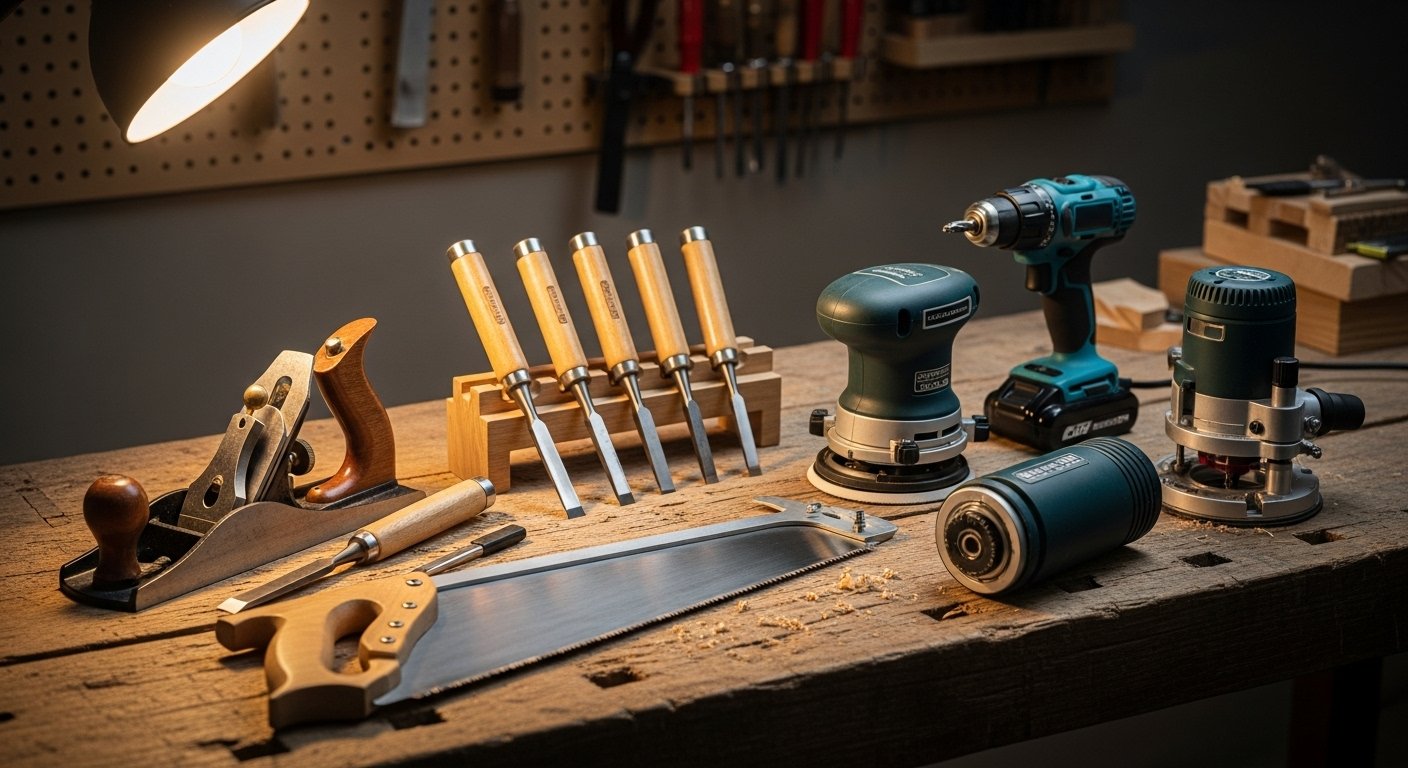Ultimate Guide: Essential Woodworking Tools for Small Shops
Starting a woodworking journey, or looking to optimize your existing compact workspace? You’ve come to the right place. Setting up a functional and efficient small woodshop requires careful selection of tools that offer versatility, precision, and the ability to handle various tasks without demanding excessive space. This ultimate guide is specifically designed for students and aspiring woodworkers to help navigate the world of woodworking tools for small shops, ensuring you invest wisely and build a productive environment, even in limited areas.
So, what woodworking tools are essential for beginners in a small space? To kickstart your small shop woodworking setup, focus on a core set of versatile tools that provide a solid foundation for most projects. Here are seven must-have woodworking tools to get started:
- Portable or Benchtop Table Saw: For accurate rip cuts and crosscuts.
- Compound Miter Saw: Essential for precise angled and crosscuts.
- Random Orbital Sander: Key for smooth finishes on your projects.
- Compact Router: Invaluable for joinery, edging, and decorative work.
- Cordless Drill/Driver Combo: Versatile for drilling holes and driving fasteners.
- Quality Chisel Set: Fundamental for detailed work and joinery.
- Assortment of Clamps: Crucial for holding workpieces securely during assembly and glue-ups.
This guide will delve into these and other vital tools, offering practical advice on how to maximize your small shop’s potential.
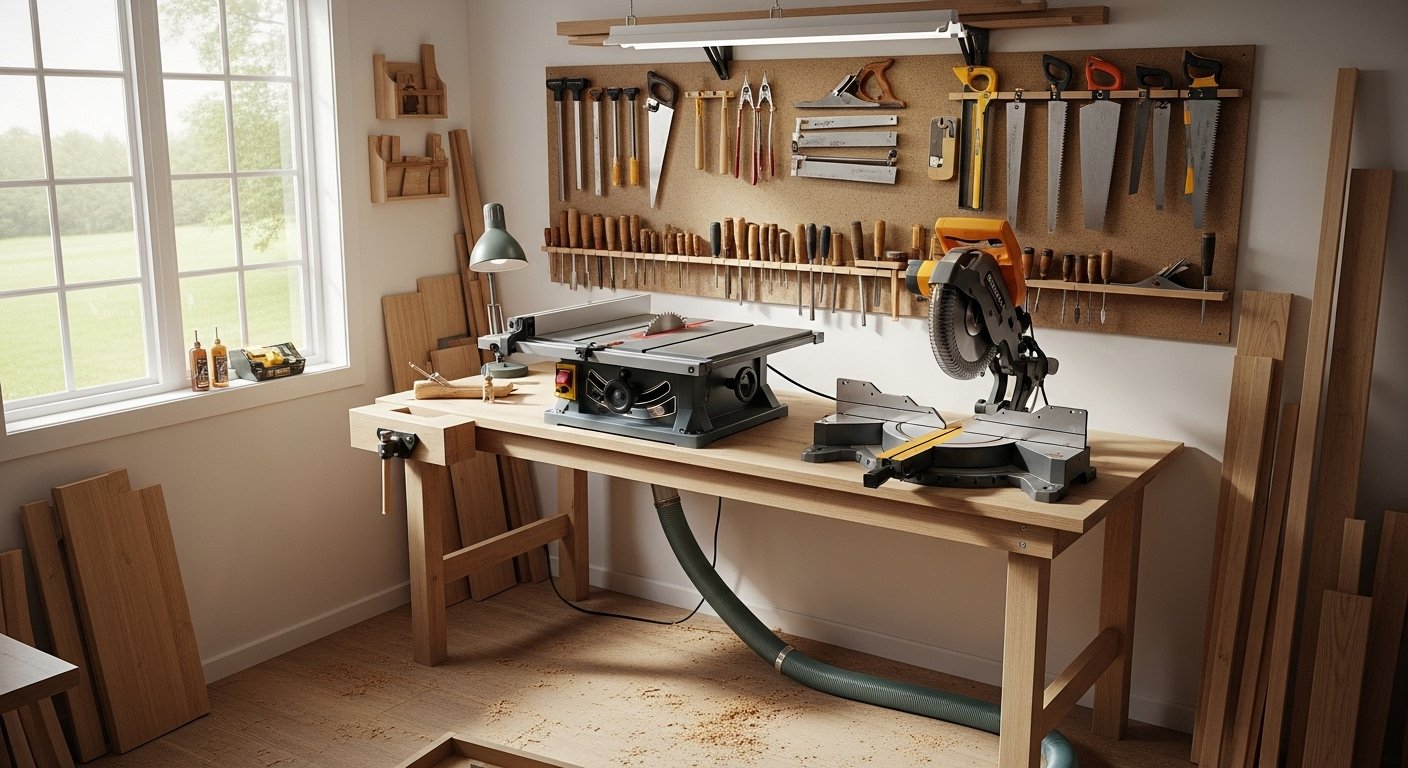
Why a Dedicated Space? The Power of Small Woodshops
Even with limited room, a well-planned small woodshop can be incredibly productive and rewarding. Many woodworkers start in garages, basements, or even spare rooms, proving that passion and smart planning outweigh sheer size. In fact, small businesses constitute 90% of the woodworking industry in the U.S., highlighting the significant impact of smaller operations. [12] These smaller shops often thrive on custom furniture projects, which can yield higher profit margins of 40-50% compared to the average 8-12% profit margin for a general woodworking shop. Therefore, optimizing your small shop woodworking setup isn’t just about convenience; it’s about building a sustainable and profitable venture.
The growing interest in home improvement and DIY projects further fuels this sector, with the Home Improvement and DIY segment of the woodworking tool market valued at USD 12.67 billion in 2023 and expected to grow at a CAGR of 4.0% from 2023 to 2032. This trend underscores the demand for accessible and efficient woodworking solutions for small spaces and hobbyists. Investing in the right tools and a smart layout can transform a humble area into a powerhouse of creativity and craftsmanship, offering practical solutions for those seeking `small workshop layout ideas` or looking to establish a `woodworking bench for small shop`.
Laying the Foundation: Essential Power Tools for Small Woodshops
When considering power tools for small woodworking shop, the key is to choose tools that offer maximum functionality in a minimal footprint. What are the most important tools in a small woodshop? Versatile, compact machines that can perform multiple tasks are invaluable. The woodworking tools market is experiencing significant growth, projected to increase from US$5.122 billion in 2021 to an estimated US$10.024 billion by 2028, with a compound annual growth rate (CAGR) of 10.07%. [12] This growth reflects the increasing demand for quality tools, including `compact woodworking tools`, that cater to the needs of modern woodworkers.
Table Saw: The Heart of the Woodshop
A Table Saw is often considered the cornerstone of any woodworking shop, large or small. For `small shop woodworking ideas`, a portable or benchtop table saw is an excellent choice. These models offer the precision needed for accurate rip cuts and crosscuts but can be moved or stored away, making them ideal `space saving woodworking tools`. Look for models with robust fences and a reliable motor. Safety features are paramount; always consult the OSHA Guide for Protecting Workers from Woodworking Hazards before operation. [2]
Miter Saw: Precision Angled Cuts
A Miter Saw, especially a compound miter saw, is indispensable for making accurate crosscuts and angled cuts. Whether you’re cutting trim, framing, or components for furniture, its precision is unmatched. Many compact models are available that don’t take up much space and can be folded away when not in use. It’s a `must-have woodworking tool for small shops` that frequently involve precise angles.
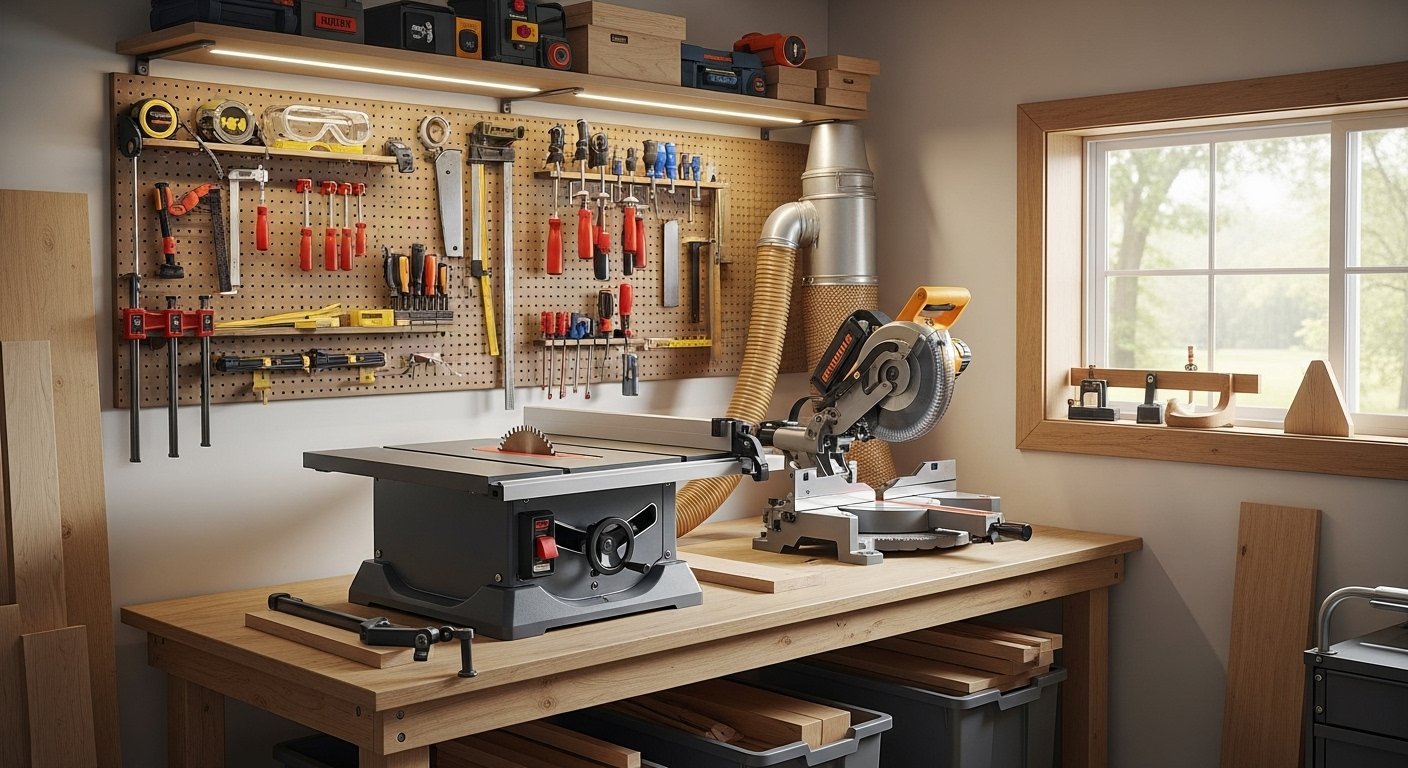
Random Orbital Sander: The Finishing Touch
A Random Orbital Sander is a workhorse for achieving smooth, professional finishes. Its random orbit action minimizes swirl marks, making it far superior to traditional pad sanders. This versatile tool is crucial for preparing surfaces for staining, painting, or oiling. Its compact size makes it perfect for `beginner woodworking tools small space` setups, and it’s an `affordable woodworking tool for beginners` that delivers immediate results.
Router: Versatility in Your Hand
A Router is incredibly versatile for various tasks, including creating decorative edges, cutting dados and rabbets for joinery, and even flattening small slabs. For a small shop, a trim router or a compact plunge router is highly recommended. These `compact woodworking tools` offer excellent control and are easy to store. Pair it with a small router table for even more functionality, turning it into one of the `most versatile tools for a small woodworking shop`.
Jigsaw: For Curves and Irregular Shapes
While a table saw handles straight cuts, a Jigsaw excels at cutting curves and intricate shapes. It’s a lightweight, portable, and `essential tool for a small woodshop` that allows for creative freedom in design. When selecting one, consider variable speed control for working with different materials and a comfortable grip for extended use.
Drill/Driver Combo: The Fastening Fundamental
A cordless Drill/Driver Combo is absolutely essential. It’s used for drilling pilot holes, driving screws, and even light sanding or buffing with the right attachments. The cordless nature offers immense flexibility and eliminates the need for power outlets in every corner of your small shop, making it a `basic woodworking tool for beginners`.
Planer: Achieving Uniform Thickness
For serious woodworkers, a Planer (specifically a thickness planer) is invaluable for milling rough lumber to a consistent thickness, resulting in perfectly flat and parallel boards. While a full-sized planer can be large, benchtop models are available that fit well into `small shop woodworking setup` plans. If a thickness planer isn’t feasible, `hand tools for small woodworking shop` like a block plane or a longer hand plane can accomplish similar tasks on smaller pieces, albeit with more effort. To explore more powerful options that can transform your workshop, consider reading our guide on top 7 power tools transform workshop.
Bandsaw: Curved Cuts and Resawing (Optional but Highly Useful)
A Bandsaw offers unique capabilities for curved cuts, resawing thin lumber, and even cutting joinery like tenons. While some models can be bulky, `compact woodworking tools` in the form of benchtop bandsaws are available. For many `small shop woodworking ideas`, a bandsaw can be a significant addition, extending your capabilities without requiring the floor space of larger machines.
Precision and Control: Hand Tools for Your Small Woodworking Shop
Despite the power and efficiency of electric tools, `hand tools for small woodworking shop` remain dominant, especially among hobbyists and in smaller workshops, due to their affordability, ease of use, and portability. They offer a level of control and finesse that power tools sometimes can’t match, making them crucial for detailed work and fine adjustments. This is why many consider them `basic woodworking tools for beginners`.
Chisel Set: For Fine-Tuning and Joinery
A sharp Chisel Set is non-negotiable. Chisels are used for paring, cleaning out dados, mortises, and for detailed shaping. Investing in a good quality set and learning how to keep them razor-sharp will significantly improve your woodworking precision. They are fundamental `essential tools for a small woodshop`.
Clamps: Your Extra Hands
You can never have too many clamps! Clamps are your extra hands for holding workpieces during glue-ups, securing jigs, and holding parts while they dry. An assortment of F-style clamps, pipe clamps, and parallel clamps will cover most needs. They are `must-have woodworking tools for small shops` and a relatively `affordable woodworking tool for beginners`.
Measuring & Marking Tools: The Foundation of Accuracy
Accuracy starts with precise measurement and marking. Essential tools include a reliable tape measure, a combination square for checking squareness and marking lines, and a marking knife for precise cut lines. These seemingly simple tools are critical for ensuring your projects come together perfectly. For a more in-depth look at starting your shop, check out our guide on 10 essential woodworking tools beginners.
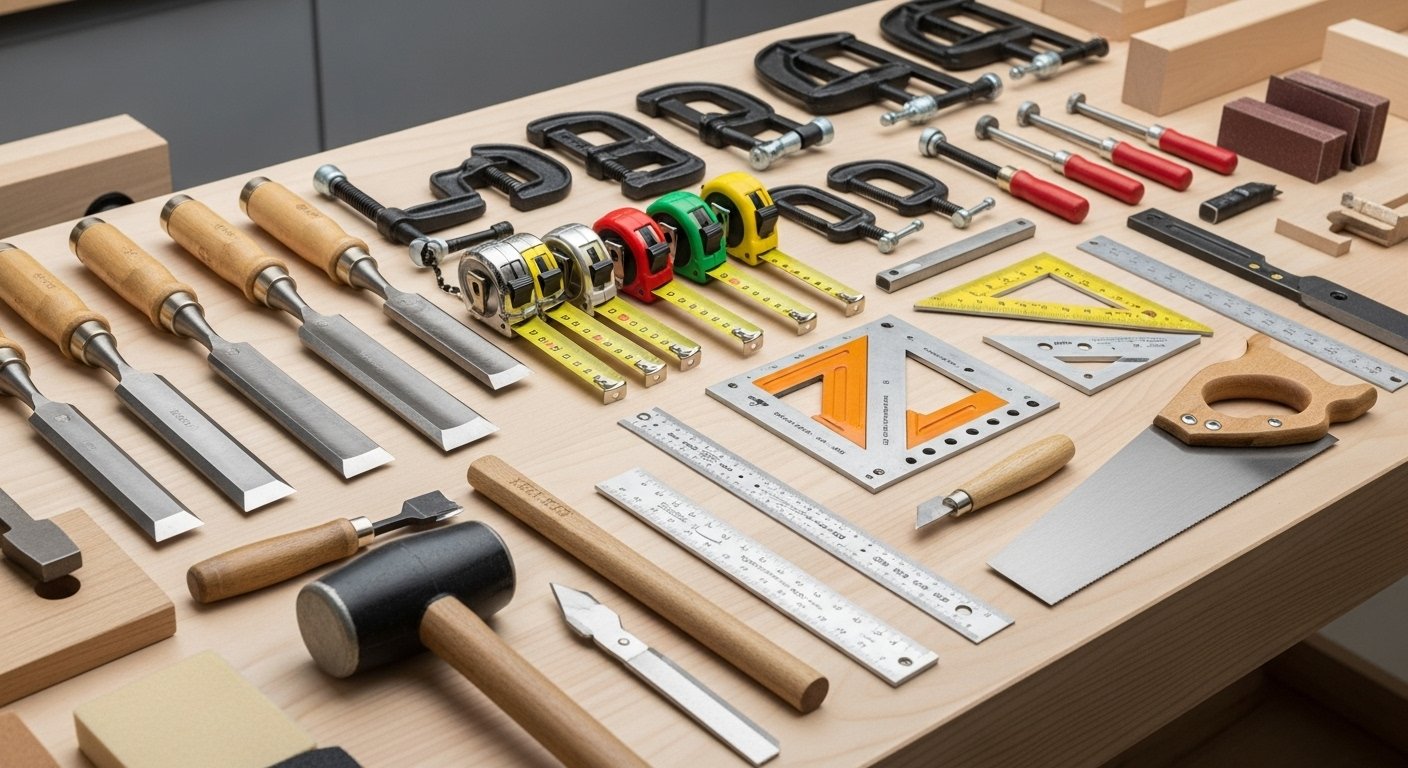
Block Plane and Hand Plane: For Fine Adjustments
A Block Plane is a small, versatile hand plane used for trimming, chamfering, and fitting joinery. A longer hand plane can be used for flattening surfaces and jointing edges. These tools provide excellent feedback and allow for very fine adjustments, perfect for achieving that smooth, perfectly fitted joint. They are excellent `space saving woodworking tools` that offer significant utility.
Japanese Handsaw: Precision Cutting
Japanese handsaws cut on the pull stroke, making them very efficient and precise with a thinner kerf. They are excellent for crosscutting, ripping, and even cutting joinery. Their precision and ease of use make them a valuable addition to `basic woodworking tools for beginners` in a small shop.
Optimizing Your Space: Small Shop Woodworking Setup & Layout
One of the biggest challenges for a `beginner woodworking tools small space` enthusiast is making the most of limited square footage. “What is the best way to set up a small woodworking shop?” and “How to maximize space in a small woodworking shop?” are common questions. The answer lies in clever organization and multi-functional solutions.
Embrace Mobility
Investing in mobile bases for your larger power tools (Table Saw, Miter Saw, Planer, Bandsaw) allows you to move them out of the way when not in use or reconfigure your `small workshop tools list` layout to suit different tasks. This transforms your shop into a `mobile woodworking shop setup`, offering incredible flexibility for `small workshop layout ideas`.
Think Vertically
Walls are your best friends in a small shop. Install shelves, pegboards, and French cleat systems to store hand tools, clamps, jigs, and materials. Vertical storage keeps your floor clear and your tools accessible. Consider a folding workbench or one with integrated storage to further save space. These are practical `small shop woodworking ideas` that dramatically improve efficiency.
Multi-Functional Tools
Look for tools that can perform more than one job. For example, a quality Router with a small router table can act as a jointer for smaller stock. Benchtop tools, in general, are `best benchtop woodworking tools` for maximizing space as they can often be stored away when not in active use. Prioritizing `space saving woodworking tools` ensures every inch of your shop works for you.
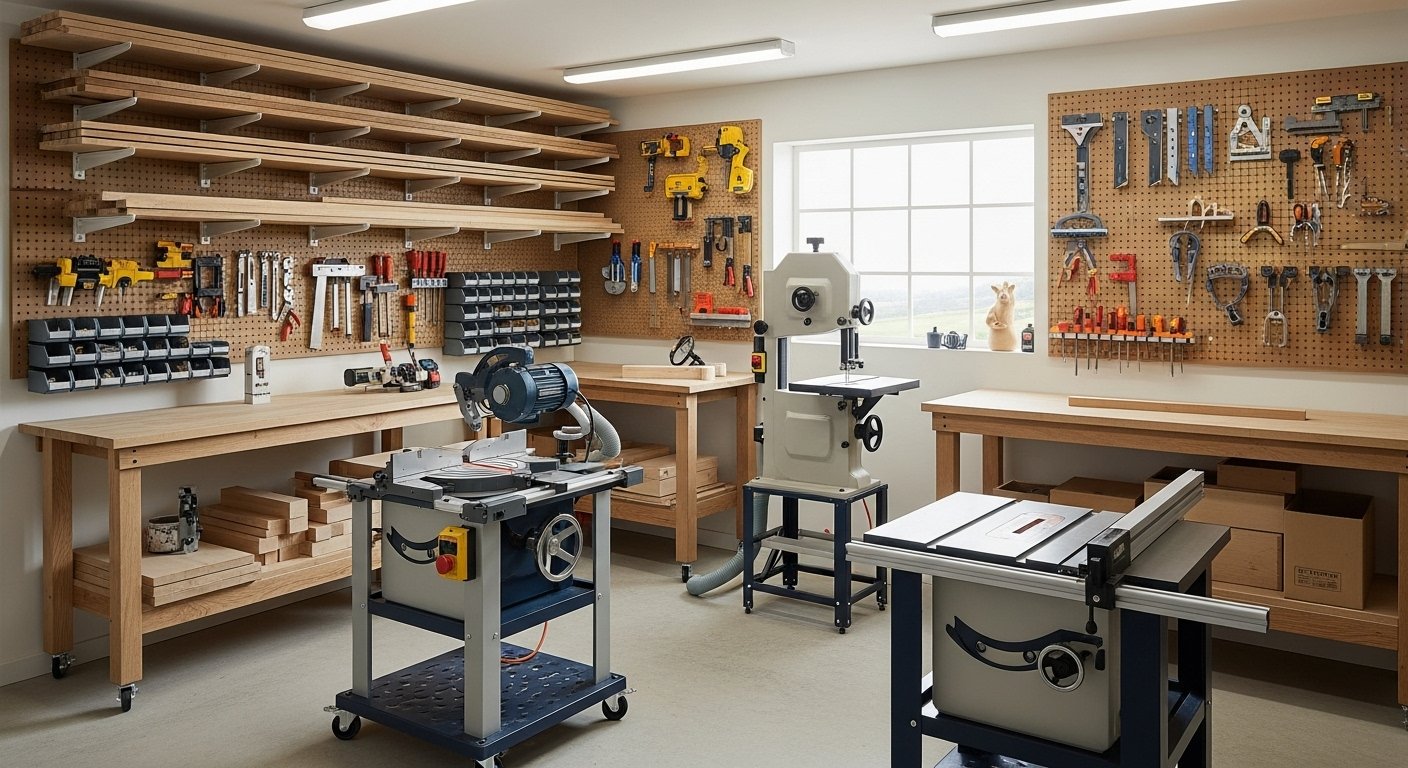
Budgeting for Your Small Woodshop: Affordable & Essential
“What is a good budget for small shop woodworking tools?” is a question with a flexible answer, but smart budgeting is key for `affordable woodworking tools for beginners`. You don’t need to break the bank to acquire `essential tools for a small woodshop`. The strategy is to prioritize quality over quantity and buy tools as your projects demand them.
Start with the `basic woodworking tools for beginners` – the hand tools and a few core power tools mentioned earlier. These `best budget woodworking tools small shop` options will allow you to complete a wide range of projects. Look for sales, consider reputable used tools, and remember that investing in quality often means tools that last longer and perform better.
For example, instead of a large, stationary Jointer, you might start with a straight edge and a Router or a good hand plane to achieve flat edges on smaller stock. Similarly, a portable Table Saw or Miter Saw can be significantly more budget-friendly and space-efficient than their full-sized counterparts. The `United States Small Business Economic Profile` provides valuable insights into the small business landscape, which can also inform realistic expectations for initial investments and growth. [15]
Beyond the Tools: Essential Shop Practices
Beyond selecting the right woodworking tools for small shops, establishing good shop practices is equally important for safety, efficiency, and the longevity of both you and your tools.
Dust Collection System: A Must-Have for Health
A Dust Collection System is not a luxury; it’s a necessity, especially in a small, enclosed space. Fine wood dust is a health hazard, and effective dust collection keeps your air clean and your shop tidy. Even a small shop can benefit immensely from a shop vacuum with a cyclone separator or a dedicated compact dust collector. For detailed advice on optimizing your system, read our guide on optimizing dust collector small shop guide.
Workbench: Your Central Command
A sturdy, flat Workbench is fundamental. It serves as your primary work surface for assembly, hand tool operations, and project layout. For a small shop, consider a mobile workbench or one with built-in storage to maximize utility. A good `woodworking bench for small shop` is often custom-built to fit the specific space and needs.
Safety First, Always
Regardless of the size of your shop, safety should be your top priority. Always wear appropriate Personal Protective Equipment (PPE), including safety glasses, hearing protection, and a dust mask. Ensure all tools are properly maintained and guards are in place. Always stay focused and avoid distractions. The OSHA Training School provides excellent `woodworking industry safety` tips that are crucial for all woodworkers to follow. [5]

Conclusion
Creating a functional and efficient small woodshop is an achievable goal for any aspiring woodworker. By thoughtfully selecting `essential woodworking tools for small shops`, embracing smart space-saving strategies, and committing to proper shop practices, you can turn even the most compact area into a highly productive woodworking haven. Remember that the journey of woodworking is continuous learning and adaptation, so start with the basics, expand as your skills and projects grow, and always prioritize safety. With the right approach, your small shop will be capable of producing beautiful and lasting projects for years to come.
